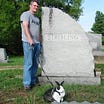“At the age of forty-two, my history of agony had painted a bullseye on me, making me easy prey for manipulation,” writes Kellie Ellen King, aka Scott Newgent. Although her new self-published memoir, The Lesbian Devil to the Straight Man Saint - a trip through trans HELL & back, suffers from the absence of a professional editor, Newgent tells a compelling story of rapid gender dysphoria in her 40s. The story of her affliction resonates with the adolescent experience of sudden transgender identification in lesbian youth.
When Newgent met ‘Jacqueline,’ she was still married to a man. “It seemed as if I needed to rip off my own flesh to escape the scorching intensity” of the relationship, Newgent writes. For despite her self-acceptance as a lesbian woman, Newgent was still competing with the husband, confronting the homophobic Christianity of Jacqueline’s family, unrecovered from sexual trauma, and affected by her own grandfather’s rejection of her as a lesbian. “The unyielding power of the God of Catholicism shattered my existence into fragments, leaving me fractured and milked, in response to the notion that a misstep occurred during my creation by my parents,” she writes. As a result, “I never met Jacqueline’s family as a woman, they had seen pictures shaking their heads, ‘the lesbian devil.’ I met them for the first time as Scott, the straight-man saint, saving Jaqueline from her sinful past.”
Newgent points to the critical role that gay shame from spiritual abuse by otherwise loving and well-meaning families has played in the spread of transgender identification among LGB youth. More than one detransitioner has spoken or written about the rejection of their same-sex attraction leading them to transition. Audrey Hale, the Nashville Covenant shooter, did not even use the word “lesbian” in her journal, referring to herself instead insultingly as a “faggot.” Newgent’s newfound belief in her transgender soul propelled her towards medical transition. “The volatile mix of religious dogma and homosexuality was a potent toxin, capable of corrupting even the strongest souls,” she writes.
Jacqueline worried that she would be denied access to her grandchildren if she remained in a lesbian relationship. This was the final straw for Newgent, who decided to pursue transition. Now Nugent’s memoir includes messages to her own grandchildren in case she does not live long enough for them to know her, since ‘gender medicine’ has shortened her life. Post-transition, no longer living with Jacqueline or her children, and housebound for fear of not “passing,” she saw that “everything I had worked for – my life’s work – had vanished into thin air.” Newgent estimates that insurance companies have been billed $1.3 million for her care, a figure multiplied by all the usual complications of phalloplasty.
Newgent never understood her experience as dysphoria until she watched Jazz Jennings with Jacqueline. “It was as if lightning had struck her, her eyes wide with revelation,” Newgent writes. “She turned to me and exclaimed, ‘Oh my god, Kellie, that’s it! You were born in the wrong body, too!’ Everything clicked for her; all the pieces fell into place as if guided by divine force.” Newgent was “both terrified and exhilarated at the thought of finding an explanation for my feelings of being out of place in my skin.”
Like so many transition stories, their next stop was “a therapist who identified as a trans woman” and affirmed Newgent, banishing doubts whenever she expressed any. At their first meeting, this therapist asked Newgent how long she had been dressing like a man even though she had always had a feminine appearance and wore a dress to the interview. “Gender ideology may be seen as a step toward progress, but for me, it feels like a giant step backwards in terms of embracing diversity and individuality.” Unfortunately, it worked on Newgent long enough to get her into the surgical ward.
“Surprisingly, the only requirement for becoming a transgender surgeon is to be a general surgeon; no specialized training is involved,” she explains. “This is concerning because procedures like phalloplasty and other bottom surgeries are considered incredibly difficult, comparable to brain surgery, and require highly skilled surgeons.” Only too late did Newgent discover that her surgeon “had moved from California to Austin after facing nine charges of medical malpractice” that “stripped him of his surgical privileges and barred him from practicing medicine in San Francisco.” Sepsis, pulmonary embolisms, fistulas, and a botched skin graft taken from her arm to form the skin-tube phallus: all these complications were inevitable from the moment he lifted the scalpel.
But justice is impossible for Newgent to get in Texas. Eight different attorneys reviewed Newgent’s malpractice claim and all of them disappointed her because the state’s Tort Reform Act “significantly limited the potential financial recovery.” This also helps explain why Austin “has become an international hub for medical transition procedures, particularly for minors” despite legislation banning such procedures for people under the age of 18.
Newgent’s transition regret feeds her fury that anyone is putting a child through the hell she endured. It is her primary motivation for writing and speaking out. Participating in the Matt Walsh documentary What is a Woman? “cost me two jobs,” she says, but was still worthwhile. It took too long for her to understand that she had swallowed a lie. “Our identities are not just self-crafted; they are shaped by forces beyond our control” – by family, by trauma, by the social pressure to conform.
At more than 300 pages, the memoir is not long. Scott Newgent’s small imperfections as a writer do not damage her testimony as a primary source. History will record that the social contagion of ‘transgender’ affected young and old alike, often for the same reasons.
Genspect publishes a variety of authors with different perspectives. Any opinions expressed in this article are the author’s and do not necessarily reflect Genspect’s official position. For more on Genspect, visit our FAQs.






